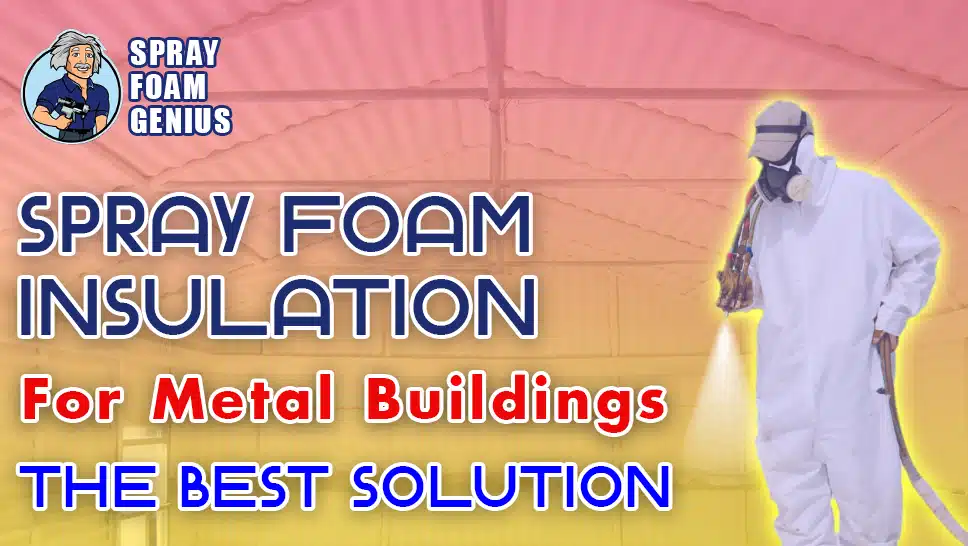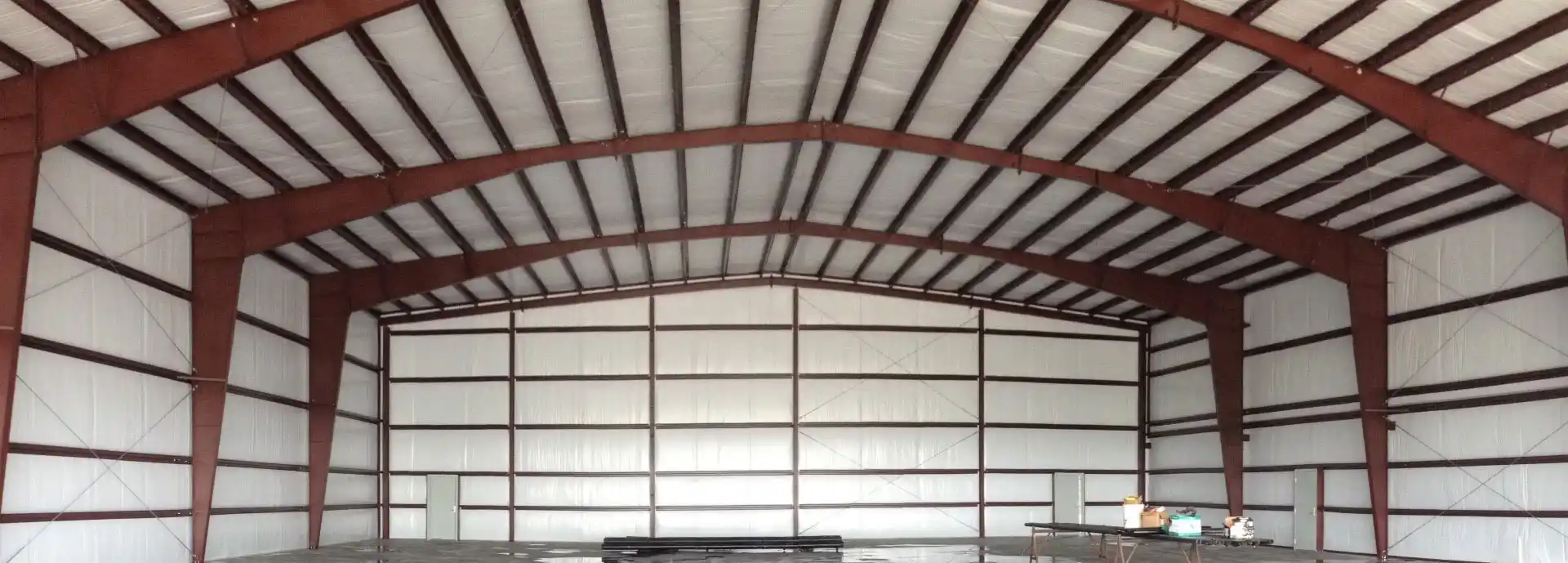
Metal buildings, whether used for commercial, industrial, or residential purposes, face unique insulation challenges. Spray foam insulation provides an effective solution to these problems by offering superior thermal resistance, moisture control, and energy efficiency. At Spray Foam Genius Marketing, we specialize in helping spray foam insulation contractors grow their businesses through professional SEO, lead generation, and more. In this post, we will explain why spray foam insulation is the best choice for metal buildings and how it compares to traditional insulation methods
Why Metal Buildings Need Special Insulation Solutions
Metal buildings are durable, versatile, and cost-effective, but they come with specific insulation challenges. Below are some of the most common issues:
Temperature Fluctuations
Metal conducts heat and cold, which can cause extreme temperature changes inside metal buildings. This makes them unbearably hot during the summer and freezing cold in the winter.
Condensation Problems
When metal surfaces come into contact with warmer indoor air, condensation forms. This can lead to moisture build-up, mold growth, and even structural damage.
Energy Inefficiency
Without proper insulation, metal buildings allow significant energy loss. This inefficiency leads to higher energy bills for heating and cooling.
What Is Spray Foam Insulation?
Spray foam insulation is a two-part liquid that expands into a thick foam upon application, filling every gap and crevice. There are two main types of spray foam insulation:
Open-Cell Spray Foam
Open-cell spray foam is lighter and less dense. It’s primarily used for soundproofing and for areas where less thermal resistance is required.
Closed-Cell Spray Foam
Closed-cell spray foam is denser, providing a higher R-value (thermal resistance). It forms an airtight seal that not only insulates but also resists moisture.
Benefits of Spray Foam Insulation for Metal Buildings
Spray foam insulation offers numerous advantages for metal buildings, making it the best solution available. Below are the key benefits:
1. Superior Thermal Performance
Spray foam insulation has a high R-value, which means it offers excellent thermal insulation. In metal buildings, this helps regulate temperatures throughout the year.
- Consistent Temperature Control: Spray foam insulation keeps hot air out during the summer and retains warmth in the winter.
- Energy Savings: By reducing the need for heating and cooling, spray foam lowers energy costs.
2. Moisture Control and Condensation Prevention
Metal buildings are especially prone to condensation, but spray foam insulation provides a solution:
- Condensation Prevention: Closed-cell spray foam acts as a vapor barrier, preventing condensation from forming on metal surfaces.
- Mold and Mildew Resistance: Spray foam’s moisture resistance reduces the risk of mold and mildew, which can lead to health issues and structural damage.
3. Durability and Longevity
Unlike traditional insulation materials like fiberglass, spray foam does not sag, shift, or degrade over time.
- Structural Strength: Closed-cell spray foam adds rigidity to metal buildings, increasing overall structural integrity.
- Long-Lasting Performance: Spray foam insulation maintains its R-value for decades, requiring less maintenance and replacement.
4. Quick and Efficient Installation
Spray foam insulation is easy to apply, making the installation process fast and efficient.
- Seamless Application: Spray foam expands into all hard-to-reach areas, forming a complete seal that eliminates gaps.
- Minimal Downtime: Installation is quick, minimizing disruption to your building operations.
Spray Foam vs. Traditional Insulation for Metal Buildings

To understand why spray foam insulation is superior, it’s important to compare it to traditional insulation options like fiberglass and rigid board.
Fiberglass Insulation
Fiberglass is commonly used in metal buildings, but it has several drawbacks:
- Lower R-Value: Fiberglass insulation doesn’t offer the same level of thermal resistance as spray foam.
- Moisture Absorption: Fiberglass absorbs moisture, leading to mold growth and loss of insulation performance.
- Air Leakage: Fiberglass doesn’t provide an airtight seal, allowing drafts and energy loss.
Rigid Board Insulation
Rigid board insulation is another option for metal buildings, but it has its own limitations:
- Difficult Installation: Rigid boards are hard to fit into irregular spaces, leaving gaps in the insulation.
- Moisture Vulnerability: While rigid boards resist moisture better than fiberglass, they can still allow condensation to form.
Why Spray Foam Is Better
Spray foam provides better coverage, a higher R-value, and a moisture barrier, making it the best choice for metal buildings.
How Spray Foam Insulation Improves Energy Efficiency
Energy efficiency is one of the top concerns for metal building owners. Poor insulation can lead to substantial energy loss, driving up heating and cooling costs. Here’s how spray foam insulation can improve energy efficiency:
Air Sealing Properties
Spray foam expands to fill every gap, creating an airtight barrier. This is something traditional insulation materials can’t achieve.
- Reduced Heating and Cooling Costs: Spray foam prevents air leakage, reducing energy loss and lowering utility bills.
- Improved Comfort: A consistent indoor temperature is maintained year-round, making the building more comfortable for occupants.
Understanding R-Value
The R-value measures an insulation material’s ability to resist heat flow. The higher the R-value, the better the insulation.
- Closed-Cell Spray Foam: Has an R-value of up to R-7 per inch, offering superior thermal insulation.
- Open-Cell Spray Foam: With an R-value of about R-3.5 per inch, open-cell foam is still effective for certain applications but less so for extreme temperature regulation.
Spray Foam and Environmental Sustainability
Beyond the immediate benefits of temperature control and energy efficiency, spray foam insulation is also an environmentally sustainable option for metal buildings.
Energy Efficiency and Reduced Carbon Footprint
Spray foam insulation’s high R-value reduces the energy needed to heat and cool a building, lowering energy consumption and greenhouse gas emissions.
- Reduced Emissions: By cutting down on the need for energy, spray foam insulation contributes to a lower carbon footprint.
Longevity and Reduced Waste
Spray foam insulation lasts longer than traditional materials, reducing the need for frequent replacements.
- Less Material Waste: Since spray foam remains effective for decades, fewer materials end up in landfills compared to other insulation types.
The Importance of Professional Installation for Spray Foam Insulation
Proper installation is key to getting the most out of spray foam insulation. Working with qualified professionals ensures the job is done right. Here’s why:
Expert Installation Ensures Even Coverage
Professional installers ensure that every part of the building is properly insulated, without gaps or missed areas.
Correct Thickness for Maximum R-Value
Experts know the proper thickness required to achieve the maximum R-value, which is crucial for thermal performance.
Safety First
Spray foam installation involves chemicals that need to be handled carefully. A professional team will ensure that the process is safe and compliant with all regulations.
At Spray Foam Genius Marketing, we connect contractors with customers who need top-quality spray foam services. Our SEO, lead generation, and business profile optimization services help spray foam contractors grow their businesses effectively.
Ready to Upgrade Your Metal Building’s Insulation? Contact Us Today!
Spray foam insulation is the best solution for metal buildings, offering superior energy efficiency, moisture control, and durability. Whether you’re a contractor looking to expand your spray foam business or a building owner seeking better insulation solutions, Spray Foam Genius Marketing can help.
Call us at 877-840-FOAM for USA and 844-741-FOAM for Canada visit our website at sprayfoamgeniusmarketing.com, or email us at [email protected] to learn how we can help you grow your spray foam insulation business.
Let’s take your business to the next level together!
- 5 Google My Business Hacks to Double Your Leads for Spray Foam Insulation Contractors - January 14, 2025
- Why Spray Foam Contractors Cannot Ignore Reputation Management in 2025 - January 13, 2025
- Local SEO Secrets Every Spray Foam Contractor Must Know to Win in 2025 - January 13, 2025

